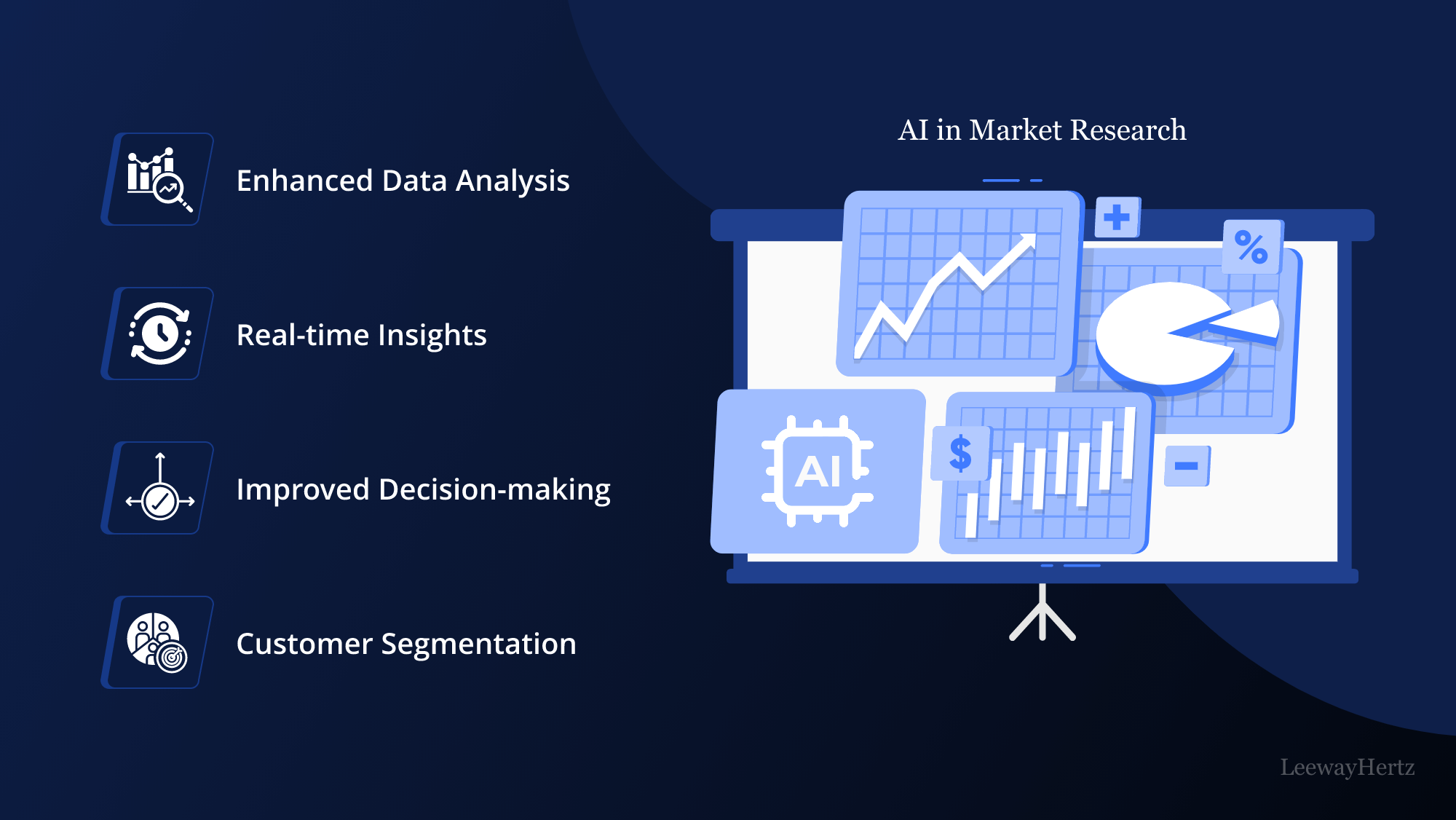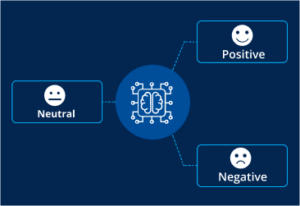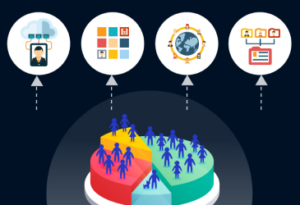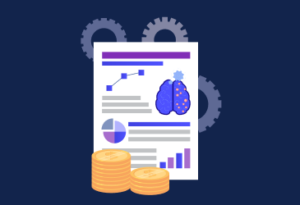AI in market research: Charting a course from raw data to strategic excellence

In today’s dynamic business landscape, success hinges on understanding the market. Navigating the road to a successful product or service is like traversing a maze – it’s all about tapping into your audience’s wants, needs, and expectations and comprehending what they are willing to spend on your offerings. This essential journey is charted by market research, an invaluable tool for business success.
Traditionally, market research has been a hands-on, meticulous task. From manual data collections to in-person focus groups, the old ways were time-consuming and resource-intensive, but they helped gather crucial insights. However, these methods had their limits, struggling to unveil the deeper nuances of consumer behavior.
Welcome to a new era where AI transforms market research. AI isn’t just a tool; it’s a game-changing ally that rejuvenates the entire field. Imagine having the power to process and analyze colossal amounts of data swiftly and accurately—something that was previously unattainable. AI, with its robust capabilities like web scraping and sentiment analysis, enables us to feel the real-time pulse of the market, amplifying our insights and decisions.
Through AI, we now have a more profound, more nuanced lens to study consumer behaviors and trends. It unveils patterns and correlations that were once hidden and projects emerging trends with astounding precision. Join us as we explore how AI is enhancing and transforming market research into a realm of remarkable new possibilities.
- What is market research?
- The role of AI in market research
- Ways to use AI in market research
- Use cases of AI in market research
- How does LeewayHertz’s generative AI platform enhance market research processes?
- Traditional Vs. AI-based market research
- Benefits of AI in market research
- The future of AI in market research
What is market research?
Market research is a pivotal, data-driven process essential for assessing the viability of new products or services and enhancing a brand’s allure. It equips businesses with crucial insights into the preferences and behaviors of their target audience, collates pertinent market information, and thoroughly analyzes customer feedback. This wealth of data serves as a robust foundation, helping navigate marketing challenges effectively. It becomes instrumental in devising potent marketing strategies, catalyzing brand innovation and fueling success.
Market research typically involves two approaches:
Primary research
This involves the initial data collection and employs qualitative and quantitative research methods. Businesses interact with their customers through surveys and questionnaires to gather information. Primary research can be broadly categorized into two types:
- Exploratory research: This approach uses open-ended interview questions, typically conducted with a sample group. It aims to uncover insights and gather preliminary information.
- Specific research: Specific research is more focused and addresses issues or questions identified during exploratory research. It seeks to find solutions or specific answers to these identified problems.
Secondary research
In this phase, businesses rely on data compiled from external sources such as government agencies, media outlets, reports, studies, newspapers, and other publications. This existing information is valuable for gaining additional insights and context, supplementing the primary research findings.
Both primary and secondary research methods play critical roles in providing a comprehensive understanding of the market, enabling businesses to make well-informed decisions and develop effective marketing strategies tailored to their audience’s needs and preferences.
The role of AI in market research
AI in market research involves integrating Machine Learning (ML) algorithms into traditional methods, such as interviews, discussions, and surveys, to enhance the research process. These algorithms enable real-time data collection and analysis, predicting trends and extracting valuable patterns. This process results in high-quality, up-to-date insights that transparently capture even minor market changes.
For instance, a health and fitness product brand can employ a custom AI model to scan online conversations about healthcare and fitness trends and competitors’ offerings across public domains. By doing so, they gain factual insights to brainstorm innovative product ideas and devise digital marketing strategies that align with market demand. This approach saves time, ensures logical decision-making, and facilitates the launch of products and services that effectively cater to the target customers’ needs, ultimately leading to a more informed and successful market presence.
Launch your project with LeewayHertz!
Revolutionize your market research with AI! Gain deeper insights, identify trends, and make data-driven decisions with LeewayHertz’s robust AI-powered solutions.
Ways to use AI in market research
Now that we have established the perfect synergy between AI and market research, the next step is understanding how precisely this alignment works. So, let’s delve straight into the ways to use AI in market research:
Open-ended text analysis
In the sphere of AI-driven market research, customer feedback remains paramount; it’s the lifeblood of businesses. Without customers, even the most sophisticated AI in market research would yield little value. This underscores the importance of attentively listening to potential and existing customers. However, manually deciphering and understanding what each customer says can be as daunting as picking up spilled mustard seeds one by one – not impossible, but undeniably tedious.
Conversely, AI seamlessly integrates into your market research workflow and solves this challenge effortlessly. Here’s how: AI scrutinizes open-ended survey responses from various communication channels, from traditional emails to contemporary social media comments. It deepens into this textual data to extract the precise thoughts and sentiments concealed within.
However, analyzing sentiment is more complex than it seems. Consider this scenario: you are researching hotel reviews and come across two contrasting comments:
Review 1: “In one word, wow! Everything about our stay was perfect, from the food, cleanliness, and courteous staff. I loved it.”
Review 2: “Breakfast wasn’t served on time, nobody bothered to clean the space, took 10+ attempts to reach out to room service on call..wow! Could it be any better?”
Relying solely on keywords for sentiment analysis won’t suffice, as the “wow” in the first review conveys a vastly different sentiment than the “wow” in the second. A robust Natural Language Processing (NLP) and deep-learning-driven sentiment analysis module are needed to avoid such cognitive pitfalls in the research. Using AI elevates market research by autonomously analyzing text in real-time, deciphering implicit sentiments instead of merely capturing literal meanings.
Conversational insight collection
In research, gathering insights from your target audience is crucial. One critical aspect of this process is engaging in meaningful conversations with respondents to discover information that can shape strategies and decisions. Consider this scenario: You’re collecting data to create a menu for a new cafe, targeting youngsters who frequently visit cafes. You ask them, “What are the top 5 items you usually order when you visit a cafe?”
You receive responses like, “Cappuccino, brownie, sandwiches, cake, croissants, etc.” Does this provide enough information to finalize your menu? Clearly, it falls short.
However, if you follow up with questions like, “Any specific type of cappuccino?” You might get answers like “Nutella cappuccino,” “java chip cappuccino,” or “Pumpkin spice cappuccino.” Similarly, asking about cake preferences might yield responses like “strawberry tea cake,” “lemon yogurt cake,” or “fruit cake.”
This highlights the importance of follow-up questions in market research to gather valuable insights. Yet, manually conducting such a conversational follow-up survey can be challenging.
AI in market research empowers businesses to effortlessly collect precise, relevant information with exceptional efficiency and accuracy. Custom AI models monitor consumer interactions, identifying recurring patterns. AI chatbots designed for conversational interactions can be trained to offer users more advanced and enhanced experiences. These AI-powered chatbots can learn and adjust based on ongoing conversations, resulting in more comprehensive consumer market insights.
Auto report generation
Accelerating the transition from insightful data to actionable strategies necessitates seamless execution, achievable through clear, visually intuitive reports. AI-driven report generation makes this crucial step effortless.
AI-driven report generation empowers businesses to craft concise reports tailored to their needs, featuring customizable metrics. Each department within an enterprise can create reports to suit their requirements precisely. This agility ensures that decision-makers receive the most relevant information, streamlining the decision-making process.
Consider a shipping business harnessing AI in market research pursuits to make more informed decisions. The operations team can generate reports regarding regional segmentation, package placement, and freight scheduling, enhancing safety and optimizing operations for cost efficiency.
Simultaneously, the accounting team can review reports showcasing expenditures and profits over a custom-defined timeline. This insight aids in fine-tuning future financial decisions, ultimately contributing to the business’s growth and sustainability. Integrating AI into report generation significantly enhances the depth and accuracy of the insights, positioning organizations for strategic success.
Customer success automation
In today’s business landscape, post-purchase customer experience is vital for retaining customers. However, effectively managing and maintaining post-purchase interactions and communications can be resource-intensive for any customer success team.
AI handles a spectrum of tasks seamlessly, from scheduling follow-ups to crafting ‘stay-in-touch’ messages. It goes beyond automation by analyzing message content and frequencies, providing valuable insights and suggesting better-performing metrics. This precision and accuracy significantly elevate customer retention, fostering a loyal customer base.
AI plays a pivotal role in maintaining track of customer feedback through predictive modeling. This involves gathering comprehensive data points related to a customer’s digital interactions with your business. AI leverages this data to streamline the prediction of the potential churn rate of customers, empowering customer success professionals to intervene and prevent customer attrition proactively. This strategic approach safeguards customer satisfaction and fosters sustained business growth in the long run.
Advanced secondary research
Effective research is a multi-step process, where each phase serves a unique purpose to differentiate one stage from another. Secondary research, as the name implies, represents a deeper investigation conducted on the information gathered during the initial round of research. This practice holds immense value for companies of all sizes, offering insights into various aspects such as understanding emerging markets, devising competitive pricing strategies, and evaluating supplier relationships.
What distinguishes primary research from secondary research is the level of detail in the information gathered. To illustrate this distinction, let’s consider a scenario where a freight rental service company conducts market research to compile a list of potential routes.
In primary research, you would directly collect competitors’ data, strengths, weaknesses, and unique selling points (USPs). This approach offers a thorough understanding of the competitive landscape.
On the other hand, secondary research aims to distill this extensive data into a concise list of routes, accompanied by a rationale that justifies your specific requirements. This is where AI in market research proves valuable. It efficiently fulfills these secondary research objectives, helping businesses make informed decisions based on well-structured insights.
Preparing questionnaire
What is even better than getting surveys completed on time? It is the art of crafting precisely tailored questions—a foundational step in effective market research. The precision of these questions directly influences the quality of responses obtained. AI solves this challenge by presenting a predefined questionnaire, meticulously analyzing the responses, and adjusting subsequent questions accordingly. This dynamic process ensures that the results closely align with the core research objectives.
AI in market research allows businesses to analyze how closely past responses align with standard answers to the questions posed. Consequently, the following questions are fine-tuned based on this analysis, enhancing response quality in real-time. This innovative approach makes data collection more efficient and insightful than ever before.
Launch your project with LeewayHertz!
Revolutionize your market research with AI! Gain deeper insights, identify trends, and make data-driven decisions with LeewayHertz’s robust AI-powered solutions.
Use cases of AI in market research
The key applications of AI in market research are:
Sentiment analysis
AI-driven sentiment analysis empowers market researchers to understand emotions, opinions, and attitudes conveyed in extensive text data from different sources like social media posts, customer reviews, and survey responses. Utilizing Natural Language Processing (NLP) algorithms, sentiments can be categorized into positive, negative, or neutral, offering crucial insights into customer perceptions and inclinations. For instance, companies in the cosmetics industry can leverage AI for market research, swiftly examining various social media posts to grasp customer sentiment regarding their recent product introduction. This insight enables informed decision-making, improved marketing strategies and product enhancements.
Predictive analytics
AI algorithms can examine past data, recognize patterns, and predict forthcoming market trends and consumer behaviors. Predictive analytics is a valuable tool for market researchers, allowing them to anticipate demand, enhance pricing strategies, and make well-informed choices concerning product innovation, marketing initiatives, and inventory administration.
For instance, consider e-commerce businesses that harness AI-driven predictive analytics. By scrutinizing historical customer data and assessing market trends, they can accurately project the future demand for various products. This insight equips them to fine-tune their marketing campaigns, ensuring that the right products are promoted to the right audience at the right time. Additionally, predictive analytics can help these retailers optimize pricing strategies, ensuring that products are competitively priced to attract customers while maximizing profitability. Furthermore, it aids in making strategic decisions regarding inventory management, reducing the risk of overstocking or understocking products.
Social media listening
AI-powered social media listening tools are indispensable resources for market researchers, as they continuously monitor and analyze conversations across social media platforms in real time. These tools can identify trending topics, track brand mentions, and analyze sentiment, offering invaluable insights into consumer preferences, behaviors, and emerging market trends.
For example, let’s consider a global tech company launching a new smartphone. They employ AI-powered social media listening tools to monitor smartphone discussions across platforms like Twitter, Facebook, Instagram, and more. The tools automatically identify conversations about the latest smartphone models, the company’s brand mentions, and relevant trending topics.
Chatbots and virtual assistants
AI-driven chatbots and virtual assistants have become pivotal in market research, engaging with consumers, gathering data, and offering personalized recommendations. These conversational tools conduct surveys, address inquiries, and extract valuable insights, enabling organizations to collect data at scale and enhance customer engagement.
For instance, in the e-commerce business, chatbots prove instrumental. They can deliver personalized product recommendations, offer round-the-clock support, and boost customer engagement. This, in turn, drives sales and elevates overall customer satisfaction, showcasing the potential of these AI-powered conversational tools in the market.
Customer journey analysis
AI algorithms are crucial in dissecting the multifaceted customer journey, scrutinizing numerous touchpoints and interactions to pinpoint pivotal moments, pain points, and opportunities for enhancement. This comprehensive understanding empowers market researchers to fine-tune marketing strategies, enhance customer experiences, and foster customer loyalty.
For example, let’s take a retail brand’s scenario. They harness AI algorithms to scrutinize customer interactions across various channels, including website visits, email engagement, social media interactions, and in-store experiences. Through this analysis, they identify crucial moments within the customer journey, such as when a potential customer explores a product page or adds items to their cart but abandons the purchase.
Demand forecasting
AI-based demand forecasting models play a vital role in anticipating future product or service demand. These AI models analyze past sales records, market trends, external influences, and even weather patterns. This accurate forecasting enables organizations to optimize various aspects such as inventory levels, production planning, and resource allocation, ultimately leading to cost reduction. Furthermore, it significantly improves the customer experience by reducing delivery times and ensuring adequate stock availability for popular items.
For example, let’s consider a consumer electronics company. By leveraging AI-based demand forecasting, they can analyze historical sales data and incorporate market trends and external factors like chip shortages. This holistic analysis helps them balance product demand effectively. They can optimize warehousing and supply-chain costs by accurately anticipating demand fluctuations and adjusting inventory levels accordingly. This helps manage costs and ensures they always have the right amount of products in stock to meet customer demands.
Consumer segmentation
AI-powered market research clustering algorithms are crucial in grouping consumers into well-defined segments based on shared characteristics such as demographics, behaviors, and preferences. This segmentation approach allows market researchers to craft highly targeted marketing strategies and messages for each segment, ultimately improving campaign effectiveness and more precise customer targeting efforts.
For instance, let’s consider how this works for fashion brands. By leveraging AI-driven clustering algorithms, fashion companies can analyze diverse data sets encompassing a wide range of customer information. This data may include age, gender, shopping habits, preferred clothing styles, brand affinities, etc. This data identifies natural groupings or segments within the customer base when processed using clustering algorithms.
Furthermore, these segments could include categories like “fashion-forward millennials,” “classic style enthusiasts,” “athleisure lovers,” and so on. Each segment represents a distinct group of customers with similar tastes and preferences. Once these segments are identified, fashion brands can tailor their marketing strategies accordingly. They can create personalized marketing campaigns that resonate with each segment’s preferences and behaviors.
Image and video analysis
The proliferation of visual content across social media and various online platforms has made AI-powered image and video analysis tools indispensable for market researchers. These advanced tools can autonomously assess and categorize visual content, detect brand logos, and recognize objects, scenes, and emotions conveyed in images or videos. This capability gives market researchers profound insights into how customers engage with visual media.
For instance, let’s consider a travel agency looking to leverage AI-powered image and video analysis. The agency can automatically analyze user-generated content shared on social media platforms by harnessing these tools. This analysis can help these travel agencies identify popular destinations, detect emerging visual trends, and gain valuable insights into customer preferences. Armed with this information, the agencies can create targeted marketing campaigns enriched with captivating visuals that resonate with their audience, enhancing their marketing strategies.
Launch your project with LeewayHertz!
Revolutionize your market research with AI! Gain deeper insights, identify trends, and make data-driven decisions with LeewayHertz’s robust AI-powered solutions.
Voice and speech analysis
Voice and speech-enabled AI marketing research tools have ushered in a new era for market researchers, offering the capability to analyze and extract valuable insights from various sources, including recorded phone calls, customer support interactions, and voice-based survey responses. Powered by Natural Language Processing (NLP) algorithms, these tools transcribe and analyze the audio data, identifying essential topics, sentiments, and levels of customer satisfaction. This invaluable information empowers businesses to enhance customer service and swiftly address issues.
For instance, let’s consider how telecom companies can leverage these AI tools. Telecoms can analyze customer call recordings, often containing a wealth of information about customer interactions. With the help of NLP algorithms, they can automatically identify key discussion topics, assess the sentiment expressed during calls (positive, negative, or neutral), and gauge overall customer satisfaction. This analysis provides telecom companies with actionable insights such as identifying pain points, improving customer service, product and service enhancement, and targeted marketing.
Voice and speech-enabled AI marketing research tools open up exciting possibilities for businesses to tap into the insights hidden within audio data.
Concept testing and product innovation
AI-powered concept testing tools are crucial for market researchers to evaluate potential market reactions to new product concepts or features before their actual launch. These tools use advanced algorithms and predictive analytics to assess reactions and feedback from potential consumers who have been presented with the product concept through methods like surveys or focus groups. This approach helps estimate market acceptance, identify improvement areas, and strategize effective product innovations based on potential consumer preferences and expectations.
Consider a scenario where a tech startup is conceptualizing a new product. Instead of employing AI-powered concept testing tools, they may engage with potential consumers through surveys, interviews, or focus groups to gather feedback. By presenting the proposed concept and directly interacting with the target audience, the startup can analyze preferences, reactions, and suggestions, enabling the product development team to gain essential insights about the market’s potential reception. This method allows them to gather valuable feedback before the product is officially launched.
How does LeewayHertz’s generative AI platform enhance market research processes?
LeewayHertz’s generative AI platform, ZBrain, plays a transformative role in reshaping the market research landscape by providing organizations with exceptional insights and a distinctive competitive edge. As a comprehensive, enterprise-ready platform, ZBrain empowers businesses to design and implement applications tailored to their specific operational requirements. The platform uses clients’ data, whether in the form of text, images, or documents, to train advanced LLMs like GPT-4, Vicuna, Llama 2, or GPT-NeoX for developing contextually aware applications capable of performing diverse tasks.
In the field of market research, enterprises confront challenges like gaining a comprehensive understanding of customer needs, assessing market trends, mitigating risks, and making informed decisions for strategic growth, requiring a continuous stream of actionable insights. ZBrain effectively addresses these challenges through its distinctive feature called “Flow,” which provides an intuitive interface that allows users to create intricate business logic for their apps without the need for coding. Flow’s easy-to-use drag-and-drop interface enables the seamless integration of large language models, prompt templates, and media models into your app’s logic for its easy conceptualization, creation, or modification.
To comprehensively understand how ZBrain Flow works, explore this resource that outlines a range of industry-specific Flow processes. This compilation highlights ZBrain’s adaptability and resilience, showcasing how the platform effectively meets the diverse needs of various industries, ensuring enterprises stay ahead in today’s rapidly evolving business landscape.
ZBrain applications enable organizations to identify market trends, optimize resource allocation, expedite data analysis, enhance data accuracy, and formulate highly personalized and adaptive business strategies while upholding strict privacy standards. The outcomes include increased productivity, refined strategic decision-making, quicker research delivery, and elevated measures in market research for enhanced operational efficiency and sustained success.
Traditional Vs. AI-based market research
|
Aspect |
Traditional market research |
AI-based market research |
|---|---|---|
|
Data collection |
Primarily manual methods such as surveys, focus groups, interviews, and observations. |
Utilizes automated data collection methods, including web scraping, social media monitoring etc. |
|
Data processing |
Manual data entry and analysis, often time-consuming and prone to human error. |
Automated data processing includes natural language processing, machine learning, and data analytics to extract insights from large datasets quickly. |
|
Data volume |
Limited by the capacity of human researchers and resources. |
Can handle vast amounts of data efficiently and can analyze big data sets. |
|
Speed of analysis |
Slower due to manual data processing and analysis. |
Much faster, with real-time or near-real-time analysis capabilities. |
|
Accuracy and consistency |
Susceptible to human bias and errors, which can impact the accuracy and consistency of findings. |
Less prone to bias and errors, leading to more consistent results. |
|
Cost |
Can be costly due to labor-intensive data collection and analysis processes. |
Often more cost-effective over the long term as AI automates many tasks. Initial investment in AI technology may be required. |
|
Scalability |
Limited scalability due to reliance on human resources. |
Highly scalable, can handle large-scale projects with ease. |
|
Insights and prediction |
May provide descriptive insights based on historical data but limited in predictive capabilities. |
Can provide predictive analytics and forecasting based on data patterns and machine learning algorithms. |
|
Real-time monitoring |
Limited ability for real-time monitoring and instant updates. |
Well-suited for real-time monitoring, allowing businesses to react quickly to changing market conditions. |
|
Personalization |
Limited capacity for personalized recommendations and insights. |
Can deliver highly personalized recommendations and insights to individual customers. |
|
Market segmentation |
Often relies on predefined market segments. |
Can identify micro-segments and niche markets through advanced analytics. |
|
Competitive analysis |
May require manual research to gather competitive intelligence. |
Can automate competitive analysis through web scraping and sentiment analysis. |
|
Ethical considerations |
Primarily involves ethical considerations related to participant privacy and data handling. |
Includes ethical concerns related to data privacy, algorithm bias, and transparency. |
|
Innovation |
Limited ability to innovate in research methodologies. |
Provides opportunities for innovative research approaches and the development of new analytical models. |
It’s important to note that while AI-based market research offers many advantages, it should be used in conjunction with traditional methods to ensure a comprehensive understanding of the market. Additionally, ethical considerations and data privacy should always be prioritized in AI-based research.
Benefits of AI in market research
Improved data collection: AI-integrated tools expedite data collection, efficiently gathering real-time customer input and analyzing feedback for patterns and trends. Unlike traditional methods, often involving manual and time-consuming processes, AI automates these tasks precisely and efficiently. This accelerates the research process, enabling businesses to respond more rapidly to evolving customer preferences and market dynamics, ultimately gaining a competitive edge.
Enhanced data analysis: AI, equipped with its computational power, swiftly and precisely deciphers extensive datasets. It reveals complex patterns and valuable insights that would prove challenging or nearly impossible for human analysts to identify through manual examination. This efficiency streamlines data analysis, leading to more informed decision-making across various domains.
Personalization: AI harnesses customer data to provide personalized marketing recommendations that align with each individual’s preferences and behaviors. By analyzing a person’s past interactions and choices, AI can suggest products, services, or highly relevant content. This level of personalization fosters deeper customer engagement and increases satisfaction, as customers perceive that a brand comprehends and caters to their distinct needs and preferences. Ultimately, this results in more effective marketing campaigns and stronger customer loyalty.
Better customer segmentation: AI enhances customer segmentation, enabling businesses to categorize their customer base precisely. This refined segmentation empowers companies to tailor marketing strategies to specific customer groups, effectively identifying those most likely to respond positively to particular campaigns.
Launch your project with LeewayHertz!
Revolutionize your market research with AI! Gain deeper insights, identify trends, and make data-driven decisions with LeewayHertz’s robust AI-powered solutions.
Real-time insights: AI provides instant updates on what customers are doing, helping businesses quickly adjust their plans to keep up with changes. This agility enhances a company’s ability to stay competitive and adaptive in a rapidly changing market landscape.
Predictive analytics: AI anticipates customer behaviors and market trends, enabling businesses to sustain a competitive advantage and make well-informed choices for future product development and marketing strategies. This predictive capability equips companies with valuable foresight, allowing them to stay ahead in a dynamic business environment.
Improved decision-making: AI provides valuable insights that surpass human capabilities, enabling businesses to make more informed decisions rooted in evolving trends and consumer preferences. This advanced data analysis equips organizations with a competitive edge, as they can better understand market dynamics and consumer behavior, leading to more strategic and effective decision-making.
Increased efficiency: AI streamlines labor-intensive tasks like data entry, freeing market researchers to concentrate on more valuable endeavors such as in-depth analysis and strategic planning. This automation enhances productivity and empowers professionals to contribute more significantly to their research and business objectives.
Faster research delivery: In market research, speed is key to maintaining relevance. Delays can lead to outdated insights and inaccurate sentiment analysis. A significant portion of a market researcher’s time is consumed in report writing, causing further delays and outdated data. AI-powered market research, on the other hand, provides results almost instantly. AI technology swiftly gathers data from a chosen target audience, automatically scans keywords or topics, and does it all faster than a human researcher would.
Flexible solution: Effective research relies on data collection tools tailored to the target audience. Surveys, like customer satisfaction surveys, must be user-friendly to avoid low response rates that can distort scores or yield inaccurate information.
AI technology introduces flexibility and interactivity to surveys by adapting to customer responses. Machine learning enables dynamic analysis, enhancing existing tools to better align with customer preferences and needs. This adaptability ensures that data collection processes are more responsive and capable of delivering higher-quality information.
The future of AI in market research
Let’s delve into how artificial intelligence might impact market research in the coming years, particularly in virtual market research and forecasting, chatbots and virtual moderators, and conducting secondary research.
Virtual market research & forecasting
A common issue in conventional market research frequently pertains to the adequacy and representativeness of the sample size, which is the total count of participants or data points collected in the research sample. AI is poised to address this issue through the concept of virtual panels. Instead of relying solely on large and expensive respondent samples, AI can cluster behavioral traits from smaller samples and create a larger virtual pool of respondents. This approach enables more accurate predictions of consumer behavior. While there may be limitations, such as initial binary answers, the ability to run numerous experiments simultaneously is a significant advantage. This can be particularly useful for determining optimal product pricing or assessing the impact of attribute changes on sales.
Chatbots & virtual moderators
AI-driven chatbots and virtual moderators are evolving in the realm of qualitative research. Currently, they are limited to delivering pre-programmed questions in a conversational format. However, as AI advances, there’s potential for these tools to interpret respondent answers and engage in dynamic, tailored conversations. This would represent a shift from a question delivery format to a virtual moderator capable of probing interesting points and tailoring follow-up questions. This development could change the scalability of conversational qualitative research.
Conducting secondary research
Secondary or desk research involves gathering and analyzing existing data and information. AI has a significant role to play in automating this process. AI algorithms can efficiently sift through vast amounts of data from online databases, reports, and articles. They can extract relevant insights, identify market trends, assess competitor performance, and help in decision-making processes. AI-driven secondary research saves time and ensures that organizations have access to up-to-date and comprehensive information, making it an essential tool for market analysis and strategy development.
AI is poised to transform market research by enabling more efficient and cost-effective data collection, analysis, and interpretation approaches. These advancements will lead to more accurate predictions, greater scalability, and enhanced decision-making capabilities for businesses across various industries. As AI continues to evolve, its impact on market research will likely grow significantly in the years ahead.
Endnote
The importance of AI in market research cannot be overstated. It has liberated people involved in market research from the constraints of traditional data-gathering methods, opening up a world of real-time insights and predictive capabilities. The ability to monitor market trends, analyze sentiment, and track social media dynamics has become indispensable for businesses seeking a competitive edge.
Launching a successful product or service in the fast-paced business world is akin to navigating a complex maze where AI serves as a guiding light. It empowers companies to make informed decisions based on a wealth of data, transforming raw information into actionable insights with remarkable speed and precision.
In this rapidly changing landscape, AI in market research is not just an advantage; it is indispensable for those who seek to thrive and remain competitive. As we move forward, the fusion of AI and market research will continue to shape the business world, providing a clearer path through the intricate maze of the market and enabling companies to navigate it with confidence and precision.
Transform data into strategy today! Leverage LeewayHertz’s cutting-edge AI solutions to elevate your market research operations.
Start a conversation by filling the form
All information will be kept confidential.
FAQs
What does market research entail?
Market research involves the systematic gathering, analysis, and interpretation of data related to a target market. It aims to understand consumer behavior, preferences, and market dynamics, providing valuable insights for informed business decisions.
What is the role of AI in market research, and what are its benefits?
AI plays a crucial role in market research by automating data analysis, pattern recognition, and predictive modeling. It enhances the speed and accuracy of extracting meaningful insights from vast datasets, enabling highly informed decision-making.
The benefits of AI in market research include improved speed and accuracy, deeper insights through advanced analytics, cost savings, and the ability to process large datasets efficiently, leading to more strategic decision-making.
In what ways can AI be applied in market research?
AI is applied in market research for tasks like sentiment analysis, predictive analytics, trend identification, and automated survey analysis. These applications streamline processes, uncover hidden patterns, and provide a deeper understanding of market dynamics.
What distinguishes traditional market research from AI-based approaches?
Traditional market research relies on manual data collection and analysis, which can be time-consuming and subjective. AI-based market research leverages automation, machine learning, and data processing to deliver faster, more objective, and data-driven insights.
What are the use cases of AI in market research?
AI is integral to various market research applications, including automated sentiment analysis to gauge consumer opinions, predictive analytics for forecasting market trends, competitor analysis using advanced algorithms, and social media listening to understand brand perception. AI enhances efficiency by automating survey analysis, uncovering patterns in consumer behavior, and delivering actionable insights from vast datasets. These diverse use cases showcase AI’s transformative role in making market research more accurate, timely, and strategically impactful for businesses.
How can LeewayHertz help integrate AI solutions into our market research strategies?
LeewayHertz specializes in developing customized AI solutions tailored to your market research needs, ensuring seamless integration with your existing strategies.
Can LeewayHertz customize AI-powered solutions to meet my specific market research needs, such as consumer behavior analysis or trend forecasting?
Yes, LeewayHertz excels in creating tailored AI solutions. Whether it’s consumer behavior analysis, trend forecasting, or other specific requirements, our team can design and implement solutions that align with your unique market research goals.
What AI technologies does LeewayHertz specialize in for market research applications, and how can these technologies provide a competitive advantage in the industry?
LeewayHertz excels in various AI technologies, encompassing natural language processing, machine learning, and computer vision. These technologies offer a competitive edge by enabling advanced analysis, predictive modeling, and automation in market research.
What kind of data security measures does LeewayHertz employ to ensure the confidentiality and privacy of sensitive market research data processed through AI systems?
LeewayHertz prioritizes data security. We implement robust encryption, access controls, and compliance with industry regulations to safeguard the confidentiality and privacy of your sensitive market research data.
Can LeewayHertz assist in integrating AI solutions with existing market research tools and platforms that my company may already be using?
Yes, LeewayHertz has expertise in seamless integrations. Our team can work with your existing tools and platforms to ensure a smooth integration of AI solutions into your current market research workflows.
How does LeewayHertz approach the implementation and deployment of AI-driven market research solutions, and what is the expected timeline for seeing tangible results?
LeewayHertz follows a systematic implementation process. The timeline for tangible results depends on the complexity of the solution, data availability, and specific requirements. Our team will work closely with you to establish realistic timelines.
What level of technical support and maintenance does LeewayHertz offer after the implementation of AI solutions for market research, and how quickly can issues be addressed?
LeewayHertz provides comprehensive technical support and maintenance post-implementation. Our team is committed to addressing issues promptly, ensuring the smooth operation of AI solutions in your market research processes.
What steps does LeewayHertz take to ensure compliance with relevant regulations and ethical considerations when utilizing AI in market research?
LeewayHertz is committed to ethical AI practices and compliance with relevant regulations. We ensure that our AI solutions for market research adhere to industry standards and legal requirements, prioritizing transparency and responsible use of data.



















